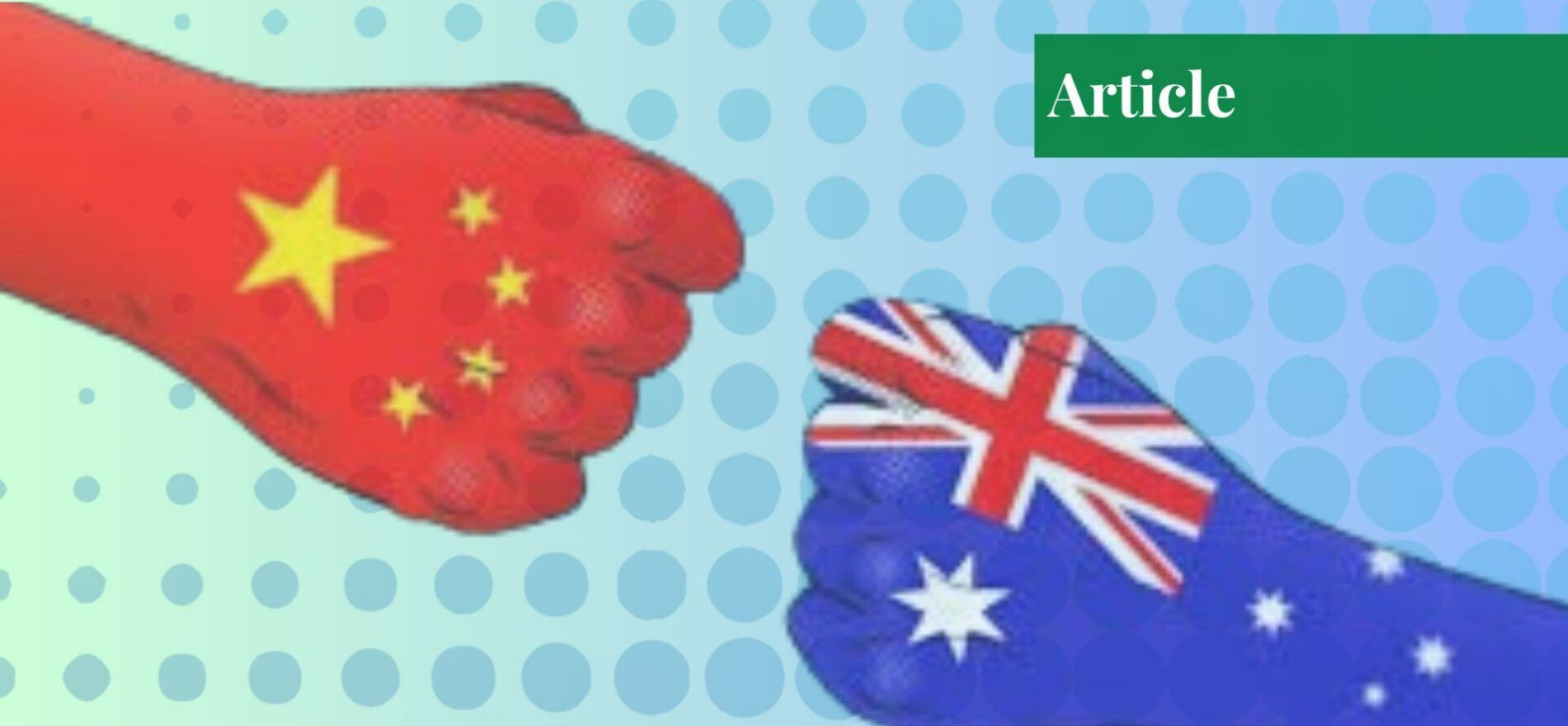Sabrina Sohail is a student of National Defense University, Islamabad.
The historical visit of Australian Prime Minister Anthony Albanese to China brought speculation of Australia-China Relations leaping forward in the history of their bilateral relations. Making him the first Australian PM to visit China in 7 years, Anthony shed light on the importance of their relations with China, their biggest trading partner.
Subsequently, the visit by the Prime Minister stood as a ray of hope for businessmen and traders alike who saw the event as a pre-step to re-continuing economic exchange agreements between the two countries. Indeed, the visit reciprocated in the stabilization of relations and saw a decrease in tariffs and bans on imports and exports exchange but with many aspects left untouched. PM Albanese had already made it clear that China was an important ally for Australia. So, the change in leadership of Australia and the economic restriction posed by China made Australia take a step back and minimize targeting their largest trading partner on different fronts.

Photograph: Lukas Coch/EPA
Many speculated that Australia and China have come to realize each other’s significance and would choose to avoid any offensive stance against one another. It soon proved not to be the case. Soon after the visit by Albanese, things went south when it was confirmed that Australian warships were being deployed in the South China Sea. Nearing a redline of China immediately after an attempt made to patch things up is a risk only a few would take. Correspondingly, one can see that for China and Australia bilateral relations have always been edgy. Not all visits and impressions of positive relations translate into an ever-lasting friendship.
Since the beginning of China and Australia’s diplomatic ties, 40 years ago, both countries have seen regular highs and lows in these relations. This reached a historic all-time low in the past 3-4 years which saw the comprehensive strategic partnership between China and Australia turn into political upheaval, a blame game, and the use of economic weapons to make the point against one another.
Particularly the year 2018 witnessed the exclusion of Huwaei, a Chinese company, from the rollout of the 5G network. This began the rift between the two countries but majorly with a political response. However, Australian PM Scott Morrison’s instigation to initiate an independent investigation to unveil the origins of the Covid pandemic in 2020 flamed to see the rift turn into a trade war. Australian industries suffered largely when their goods saw a chain of tariffs and restrictions on their beer, wine, coal, and timber items.
This led to Australia facing a huge blow to its economy while the same reciprocated for China too so even though there existed engagements on a smaller level, for most, these were the years of frozen relations between China and Australia.
Under Prime Minister Albanese’s administration, Australia recognized that trade with China is worth more than trade with Japan, the US, and South Korea combined. Consequently, normalizing Australia-China relations viz-a-viz complementary economies should be set as a priority. For 18 months, since Anthony Albanese came to power, both countries have been involved in trying to mend things and reach an agreement to reconcile for engagement with China. Bilateral meetings on the sidelines of conferences and summits between officials from China and Australia have resulted in declining tariffs to a great number and they were eventually set to be decreased to a greater level after the meeting between the leadership of both, Australia and China.
However, the anti-China factors engulfing Australia have led to the country taking measures that are being seen as a security threat to Chinese national interests. For Australia, there is a need to take a proper stance amid the superpower struggle between China and the US. If it wants to stick to a policy of non-interreference and staying neutral then it needs to stand firm by it. Regardless of its perspectives, Australia has deeper economic ties with both China and the US and is dependent on both these countries for markets and exports.
Under this situation, if Australia continues to work on the instigation of one side and remain positioned against the other then it is going to cost them millions of dollars for which the country is not ready. In November 2023, Australia alleged a Chinese navy warship of acting improperly with an Australian vessel in international waters. For China, rejecting these allegations did not mean an end, as the allegation itself, for them, stood as a remark against China for its activities in the South China Sea.
Many countries like the Philippines have accused China of using its hard power to administer its claims over the South China Sea, which for the country lies in a historical account that is to rule the South China Sea up to 10 dash lines. The Philippines along with other stakeholders of the South China Sea, according to the UNCLOS has sovereignty and the right to govern up to a specific extent of the South China Sea existing up to 200 nautical miles from the base land. Recently, these countries have been involved in holding military drills with the aid of international powers like the US to showcase their power against China which acts as the sole governor of the Sea. Under such circumstances, Australia, in hidden terms accusing China of limiting its freedom of navigation while their warship was moving closer to the Japanese exclusive economic zone in the Sea, stands as the projection of taking sides in the dispute over the Sea. The issue did not end here but went forward with Australia admitting that their warship had moved through the Taiwan Strait. The China-Australia bond does stretch thin whenever Taiwan is involved.
Touching two redlines at once because according to China, Taiwan is part of the Chinese administration and not an independent entity while the South China Sea also belongs to them and is a manifestation of their national interests that lie in both these stances. The Chinese Administration has warned Australia to avoid such provocations as China will not sit silent when any of their national interests are being compromised. This clear warning for Australia comes at a time when Western involvement over the Taiwan question and South China Sea dispute has increased. Australia, taking sides with whatever one of its allies is saying can cause major damage to the country’s national interests.
For China, Australia stands as an important partner, not only in regard to natural and renewable resources but also as having an ally among the Western powers through which it can control a hold over economic as well as political maneuvers. Owing to this importance, China has taken steps where needed and has readily accepted Australia’s step to strengthen relations.
However, for Australia walking on thin ice, where a small matter can escalate into a major confrontation, is prioritized instead of taking the smooth path. For China, taking a stance for Taiwanese independence and rejecting Chinese claims in the South China Sea reciprocates as ending ties with China. Thus, for Australia-China relations to improve, both countries must realize the importance of each other and take steps that can help stabilize their relations and fulfill each other’s interests instead of playing the game of politics.
Using freedom of navigation as a pretext to hold military drills and deploy warships is a security threat no country would like. Consequently, for Australia, shaping a clear policy is necessary as it needs to act with great prudence and analyze its steps in any matter. Australian economic benefits lie with both the US and China so siding with one will only cause problems, the government is not yet ready for.
If you want to submit your articles, research papers, and book reviews, please check the Submissions page.
The views and opinions expressed in this article/paper are the author’s own and do not necessarily reflect the editorial position of Paradigm Shift.



















